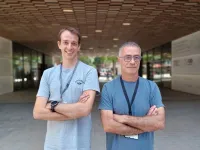(Press-News.org) Stories written with AI assistance have been deemed to be more creative, better written and more enjoyable.
A new study published in the journal Science Advances finds that AI enhances creativity by boosting the novelty of story ideas as well as the ‘usefulness’ of stories – their ability to engage the target audience and potential for publication.
It finds that AI “professionalizes” stories, making them more enjoyable, more likely to have plot twists, better written and less boring.
In a study in which 300 participants were tasked with writing a short, eight-sentence ‘micro story’ for a target audience of young adults, researchers found that AI made those deemed less creative produce work that was up to 26.6% better written and 15.2% less boring.
However, AI was not judged to enhance the work produced by more creative writers.
The study also warns that while AI may enhance individual creativity it may also result in a loss of collective novelty, as AI-assisted stories were found to contain more similarities to each other and were less varied and diverse.
The researchers, from the University of Exeter Business School and Institute for Data Science and Artificial Intelligence as well as the UCL School of Management, assigned the 300 study participants to three groups: one group was allowed no AI help, a second group could use ChatGPT to provide a single three-sentence starting idea, and writers in the third group could choose from up to five AI-generated ideas for their inspiration.
They then recruited 600 people to judge how good the stories were, assessing them for novelty – whether the stories did something new or unexpected – and ‘usefulness’ – how appropriate they were for the target audience, and whether the ideas could be developed and potentially published.
They found that writers with the most access to AI experienced the greatest gains to their creativity, their stories scoring 8.1% higher for novelty and 9% higher for novelty compared with stories written without AI.
Writers who used up to five AI-generated ideas also scored higher for emotional characteristics, producing stories that were better written, more enjoyable, less boring and funnier.
The researchers evaluated the writers’ inherent creativity using a Divergent Association Task (DAT) and found that more creative writers – those with the highest DAT scores – benefitted least from generative AI ideas.
Less creative writers conversely saw a greater increase in creativity: access to five AI ideas improved novelty by 10.7% and usefulness by 11.5% compared with those who used no AI ideas. Their stories were judged to be up to 26.6% better written, up to 22.6%, more enjoyable and up to 15.2% less boring.
These improvements put writers with low DAT scores on a par with those with high DAT scores, effectively equalising creativity across the less and more creative writers.
The researchers also used OpenAI’s embeddings application programming interface (API) to calculate how similar the stories were to each other.
They found a 10.7% increase in similarity between writers whose stories used one generative AI-idea, compared with the group that didn’t use AI.
Oliver Hauser, Professor of Economics at the University of Exeter Business School and Deputy Director of the Institute for Data Science and Artificial Intelligence, said: “This is a first step in studying a question fundamental to all human behaviour: how does generative AI affect human creativity?
“Our results provide insight into how generative AI can enhance creativity, and removes any disadvantage or advantage based on the writers’ inherent creativity.”
Anil Doshi, Assistant Professor at the UCL School of Management added: “While these results point to an increase in individual creativity, there is risk of losing collective novelty. If the publishing industry were to embrace more generative AI-inspired stories, our findings suggest that the stories would become less unique in aggregate and more similar to each other.”
Professor Hauser cautioned: “This downward spiral shows parallels to an emerging social dilemma: if individual writers find out that their generative AI-inspired writing is evaluated as more creative, they have an incentive to use generative AI more in the future, but by doing so the collective novelty of stories may be reduced further.
“In short, our results suggest that despite the enhancement effect that generative AI had on individual creativity, there may be a cautionary note if generative AI were adopted more widely for creative tasks.”
'Generative AI enhances individual creativity but reduces the collective diversity of novel content’ by Professor Oliver Hauser from the University of Exeter Business School and Professor Anil Doshi from the UCL School of Management, is published in Science Advances.
END
AI found to boost individual creativity – at the expense of less varied content
Stories written with AI assistance have been deemed to be more creative, better written and more enjoyable
2024-07-12
ELSE PRESS RELEASES FROM THIS DATE:
Texas A&M research collaboration uncovers how domestic rabbits become feral in the wild
2024-07-12
Researchers at the Texas A&M School of Veterinary Medicine and Biomedical Sciences (VMBS) have uncovered how natural selection “rewilds” domestic rabbits.
The study, published in Nature Ecology and Evolution, helps answer the question of how normally tame rabbits — which have many natural predators — can become a force of ecological destruction when purposefully or accidentally reintroduced to the wild.
Here Comes Peter Cottontail
Every gardener knows how much of a nuisance rabbits can be, but ...
Scientists find new way global air churn makes particles
2024-07-12
By Leah Shaffer
You can think of our atmosphere as a big chemistry set, a global churn of gaseous molecules and particles that constantly bounce off and change each other in complicated ways. While the particles are very small, often less than 1% of the thickness of human hair, they have outsized impacts. For example, particles are the seeds of cloud droplets, and the abundance of the particles changes the reflectivity and the amount of clouds, rainfall and climate.
Now, researchers at Washington University in St. ...
Researchers discover a new neural biomarker for OCD
2024-07-12
A recent study from Baylor College of Medicine and Texas Children’s Hospital has identified a specific neural activity pattern as a novel biomarker to accurately predict and monitor the clinical status of individuals with obsessive-compulsive disorder (OCD) who have undergone deep brain stimulation (DBS), a rapidly emerging therapeutic approach for severe psychiatric disorders. The study, led by led by Drs. Sameer Sheth and Wayne Goodman along with co-lead authors, Drs. Nicole Provenza, ...
Vivid portrait of interacting galaxies marks Webb’s second anniversary
2024-07-12
Two for two! A duo of interacting galaxies commemorates the second science anniversary of NASA’s James Webb Space Telescope, which takes constant observations, including images and highly detailed data known as spectra. Its operations have led to a “parade” of discoveries by astronomers around the world.
“Since President Biden and Vice President Harris unveiled the first image from the James Webb Space Telescope two years ago, Webb has continued to unlock the mysteries of the universe,” said NASA Administrator Bill Nelson. “With remarkable images from the ...
UMass Amherst awarded $2.1 million to advance the science of engagement in community-academic research partnerships
2024-07-12
University of Massachusetts Amherst researcher Thomas Mackie has received a $2.1 million funding award from the Patient-Centered Outcomes Research Institute (PCORI) to advance the meaningful engagement of communities that are affected by mental health disparities and underrepresented in research partnerships.
The study, entitled “Improving Research Partnership With Engagement Mapping: A Pilot Study to Advance Engagement Science” and co-led by Karen Tabb, a University of Illinois Urbana-Champaign researcher, is designed to empower community partners to have a greater role ...
With gene editing, mice with a form of inherited deafness can hear again
2024-07-12
Researchers have used gene editing to restore hearing in adult mice with a type of inherited hearing loss. They showed that shutting down a damaged copy of a gene called a microRNA (miRNA) enabled the animals to regain hearing. The approach by a research team supported by the National Institutes of Health (NIH), reported in Science Translational Medicine, may eventually lead to potential treatments for inherited hearing loss in people.
Zheng-Yi Chen, DPhil., and his colleagues at Mass Eye and Ear in Boston and other institutions studied a rare form of genetic deafness called autosomal dominant deafness-50 (DFNA50). ...
Sant Pau researchers discover a new gene that causes ALS
2024-07-12
Sant Pau researchers discover a new gene that causes ALS
Researchers from the Neuromuscular Diseases Group and the Dementia Neurobiology Group of the Sant Pau Research Institute (IR Sant Pau) and the Memory Unit of the Sant Pau Hospital, led by neurologist Dr. Ricard Rojas-García, have identified a new mutation in the ARPP21 gene that could be the cause of Amyotrophic Lateral Sclerosis (ALS), a devastating neurodegenerative disease.
Specifically, it is a shared mutation (c.1586C>T; p.Pro529Leu) in the ARPP21 gene that ...
Synthetic biology reveals the secrets of life without oxygen
2024-07-12
Long before photosynthesis brought free oxygen into the world, the earth was already populated by numerous organisms. Oxygen was life-threatening for them and therefore they developed completely different metabolic pathways to those we know from plants, animals and humans. Anaerobic bacteria have survived the ages in special, oxygen-free niches, some of them very close to us: as an essential part of the intestinal microbiome, where they are of enormous importance for the well-being of the organism. However, certain anaerobes can ...
UC3M student startup, Solaris Vita, awarded in Europe's largest entrepreneurship competition
2024-07-12
Solaris Vita, a startup created by students at Universidad Carlos III de Madrid (UC3M), has won second place in the "Innovation of the Year" category at Gen-E 2024, the largest European youth entrepreneurship competition, organized by Junior Achievement Europe. This is the first time that a Spanish university team has won this award.
The promoters of Solaris Vita, Miguel Iglesias (Industrial Engineering graduate from UC3M) and Yann Guichard (Economics student at the University), competed ...
How plant cold specialists can adapt to the environment
2024-07-12
Plant cold specialists like the spoonworts have adapted well to the cold climates of the Ice Ages. As cold and warm periods alternated, they developed a number of species that also resulted in a proliferation of the genome. Evolutionary biologists from the universities of Heidelberg, Nottingham, and Prague studied the influence this genome duplication has on the adaptive potential of plants. The results show that polyploids – species with more than two sets of chromosomes – can have an accumulation of structural mutations with signals for a possible local ...
LAST 30 PRESS RELEASES:
Kennesaw State's Vijay Anand honored as National Academy of Inventors Senior Member
Recovery from whaling reveals the role of age in Humpback reproduction
Can the canny tick help prevent disease like MS and cancer?
Newcomer children show lower rates of emergency department use for non‑urgent conditions, study finds
Cognitive and neuropsychiatric function in former American football players
From trash to climate tech: rubber gloves find new life as carbon capturers materials
A step towards needed treatments for hantaviruses in new molecular map
Boys are more motivated, while girls are more compassionate?
Study identifies opposing roles for IL6 and IL6R in long-term mortality
AI accurately spots medical disorder from privacy-conscious hand images
Transient Pauli blocking for broadband ultrafast optical switching
Political polarization can spur CO2 emissions, stymie climate action
Researchers develop new strategy for improving inverted perovskite solar cells
Yes! The role of YAP and CTGF as potential therapeutic targets for preventing severe liver disease
Pancreatic cancer may begin hiding from the immune system earlier than we thought
Robotic wing inspired by nature delivers leap in underwater stability
A clinical reveals that aniridia causes a progressive loss of corneal sensitivity
Fossil amber reveals the secret lives of Cretaceous ants
Predicting extreme rainfall through novel spatial modeling
The Lancet: First-ever in-utero stem cell therapy for fetal spina bifida repair is safe, study finds
Nanoplastics can interact with Salmonella to affect food safety, study shows
Eric Moore, M.D., elected to Mayo Clinic Board of Trustees
NYU named “research powerhouse” in new analysis
New polymer materials may offer breakthrough solution for hard-to-remove PFAS in water
Biochar can either curb or boost greenhouse gas emissions depending on soil conditions, new study finds
Nanobiochar emerges as a next generation solution for cleaner water, healthier soils, and resilient ecosystems
Study finds more parents saying ‘No’ to vitamin K, putting babies’ brains at risk
Scientists develop new gut health measure that tracks disease
Rice gene discovery could cut fertiliser use while protecting yields
Jumping ‘DNA parasites’ linked to early stages of tumour formation
[Press-News.org] AI found to boost individual creativity – at the expense of less varied contentStories written with AI assistance have been deemed to be more creative, better written and more enjoyable




